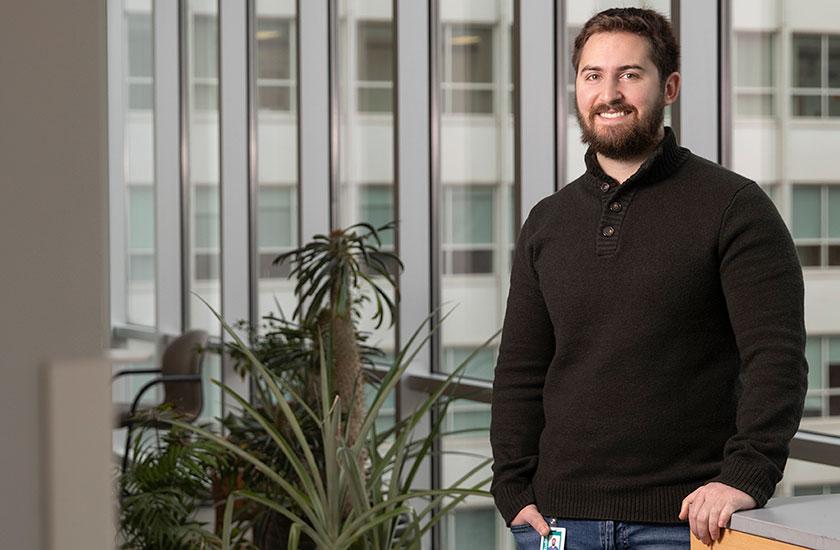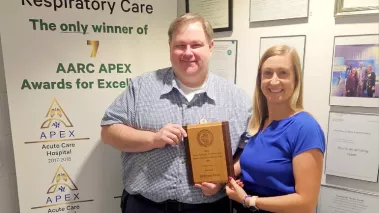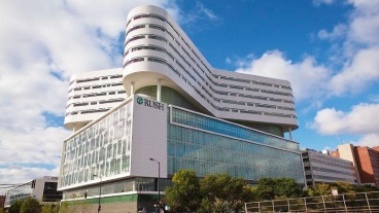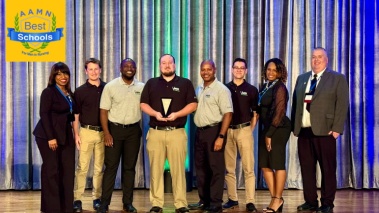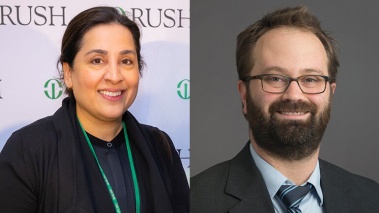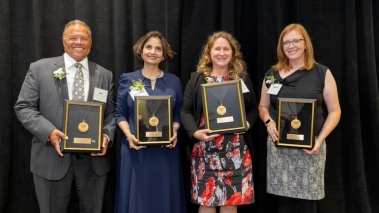Landline telephones still have their place.
For Matt Russo, he uses the aging technology to help describe where he is taking Alzheimer’s disease research. Russo, a fourth-year student in the inaugural class of Rush’s PhD in Biomedical Sciences program, recently talked about his lab work and what drew him to Rush to pursue a career in research.
Tell us about your academic background prior to joining Rush.
Matt Russo: I'm originally from Youngstown, Ohio, and came to Chicago as an undergraduate at Loyola, where I originally majored in a multidisciplinary subject called human services, which is a mixture of political science, criminal justice, sociology, social work and psychology. I was going to major in that and go to medical school, but I realized I wanted to research and teach.
So I decided to try and get some research experience under my belt. I contacted a professor who was doing interesting work, and I wore him down until he let me work in his lab. I did developmental neuroscience research with him for three years, and I ended up majoring in biology with a neuroscience minor.
What drew you to biomedical sciences research?
MR: You're in a constant state of trying to learn something new — even if it's not from your own research. You're constantly keeping up to date with new literature, and you're always trying to figure out how you can incorporate new knowledge.
There have been times when I’m doing research and would get really interesting results, and then I would start to think about the implications and start to realize we are the first people to know this particular information, which is a really exciting feeling. That’s one of the things that really drew me in — that excitement you get from discovering something new and knowing nobody else knows until you present it.
Why did you choose the Graduate College at Rush to pursue your goals?
MR: It was a new program when I started, and I thought, as a potential future faculty member, it would be a great opportunity to get involved in education and see a program develop from its first year. And as I was grappling with going to medical school or graduate school, I thought it would be good to be at an academic medical center like Rush, where I can be exposed to the clinical side and not be stuck in the lab all day.
At Rush there are opportunities to shadow clinicians and meet people who are suffering from the diseases you're studying. So you never really lose sight of why you're doing what you're doing as a researcher. A lot of the research we do here is translational in going from the bench to the bedside.
At Rush I’ve found people are really eager to know more about my research. Even outside the scientific and medical community, people are always ready to ask questions and try to understand what we do in our lab. It’s really exciting as a researcher when someone else is visibly excited about your work.
What are some interesting research projects you’re pursuing at the neuroscience lab?
MR: Right now we’re working on two major areas. One is cognitive aging, which is people getting older and losing their memory without any sort of pathology — they don't have Alzheimer's disease, they don't have Parkinson's disease, they don't have any sort of neurological disorder. They just become forgetful. And we also study Alzheimer's disease.
My project is looking at Alzheimer's disease in the context of white matter. The brain has two types of matter: white matter and gray matter. Gray matter is like a landline telephone, which receives information from other sources. The white matter is like the telephone wire that you see along the road as you're driving, and it’s basically a bunch of components of the brain that carry information from one point to another.
I’m studying that telephone wire. I want to know what's going on in these areas where information is being carried in response to Alzheimer's disease.
To continue the telephone analogy, in Alzheimer’s disease we think the insulation of the wires is breaking down and causing an unreliable signal carrying across certain regions of the brain. A lot of people in the past have focused more on the telephone itself, which makes sense because if you can't hear your friend on the other end you're going to look at your phone and try to figure out what's wrong. But if your phone is fine but the telephone wire is cut or the wire insulation is coming off and it's getting bombarded with rain and sleet, communication will break down even though the telephone is fine.
We're trying to be the maintenance workers who climb up the telephone pole to see what's going on with the wires.
Aside from research, what else has made you happy during your time at Rush?
MR: I’ve been fortunate to be the president of the Graduate College’s student council. I get to interact with a lot of people, like the deans, on a pretty regular basis, and we’ll talk if I see them in the hall.
But one of the coolest things about Rush is you don’t have to be the student council president to get involved. Rush is relatively small, so it creates an atmosphere where people are easily approachable.
There's also a lot of resources in terms of research here that I enjoy. I have been able to collaborate with different labs across campus. Maybe I don't have a piece of equipment that they have. I can just walk over, and they can show me how to use the equipment.
What are your plans for after graduation?
MR: I would like to do a combination of research and teaching at a smaller institution and use research as an opportunity to mentor students and help raise the next generation of scientists. I want to work in a small enough environment where I can have enough one-on-one time to help people reach their full potential.
What advice would you give to someone who might be thinking of following a similar path?
MR: Be flexible. Don't put yourself in a box because it’s important to explore new things.
Try to find a place to go do research. Find an opportunity to try teaching. Just because you take these opportunities doesn't mean you have to fall in love with them. I've done things I thought I would really like but ended up not being a huge fan.
Always explore and self-reflect so you can find out what you really want to do.

